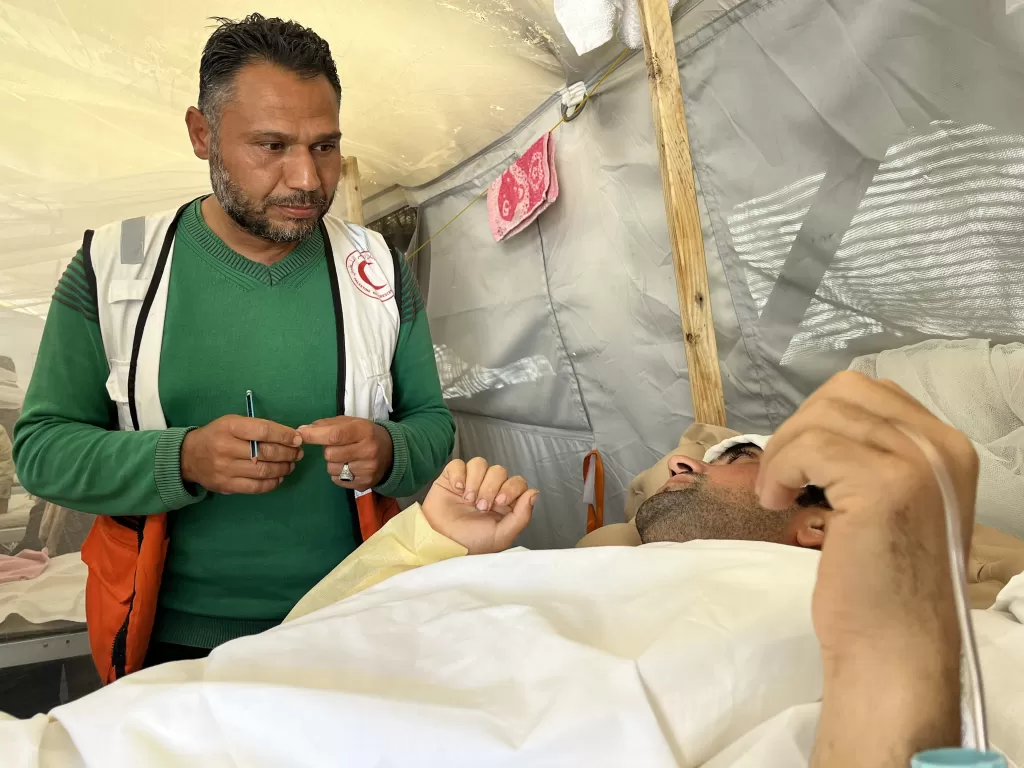
Following the ceasefire agreement, DEC charities and their local partners are preparing to scale their work up again after months of extraordinary challenges delivering aid. The levels of need in Gaza remain catastrophic.
What happens next?
Under the new agreement, access for desperately needed humanitarian aid is expected to increase. DEC charities and their local partners are preparing to rapidly adapt and expand their programmes, and resume lifesaving activities at scale, including urgently needed food and water distributions. Trucks of food, medicine and essential supplies are standing ready at the border.
During the temporary ceasefire earlier this year, they were able to replenish supplies, support local farmers, and repair damaged water systems. Despite the many challenges, the work carried out during that time shows what they are able to deliver when they are in a position to provide aid at scale. As people look towards an uncertain future, your support can be a lifeline.
What is happening in Gaza?
In August famine was confirmed in Gaza for the first time. The UN-backed global hunger monitor, the IPC, has said that famine is now a reality across Gaza City and the surrounding areas, where hundreds of thousands of people have also been displaced in recent weeks.
Gaza City and the surrounding areas have reached Integrated Food Security Phase Classification (IPC) Phase 5, which means more than 30% of children under 5 are acutely malnourished, and people are dying every day from hunger related causes. The announcement marks only the 5th time in more than 20 years that the system has been used to confirm famine.
Hundreds of thousands of people have been forced to leave Gaza City, many with nowhere to go and shelter sites already full beyond capacity. Essential services including hospitals and medical facilities overwhelmed. Food, water and medicine remain critically scarce.
Since the last ceasefire, the health system across Gaza has been decimated, and a dire shortage of fuel meant the few hospitals still operating have been forced to make impossible decisions about the treatment they can provide.
A surge in mass casualty incidents linked to aid distribution sites overwhelmed the shattered healthcare system even further, pushing it past its limit. DEC charities and their local partners continue to work separately to those distribution sites to deliver the support they are still able to, as safely as they can, such as medical care.
Through everything, staff and their families are dealing with unimaginably harsh conditions and facing significant risks as they carry out their vital work.
How have DEC charities been supporting people?
Under the new ceasefire agreement, DEC charities are hoping to rapidly adapt and expand their programmes, as access for desperately needed humanitarian aid is expected to increase.
During the temporary ceasefire earlier in the year, many DEC charities were able to replenish much-needed supplies such as food, medicine and essential hygiene items. Although in recent weeks these have run dangerously low, they helped to sustain some operations throughout this year.
Even in these dire conditions, DEC charities throughout the crisis have constantly adapted programmes when humanitarian access has been extremely limited. Donations to the Middle East Humanitarian appeal have played a key part in maintaining their work.
Cash assistance continues to provide a lifeline at times when local market prices are high, enabling families to buy some food and essential items when they become available. Trained medical staff are providing vital care in field hospitals and clinics and DEC charities and their local partners have continued delivering water, despite fuel shortages and ongoing challenges moving around Gaza.

Staff and volunteers from the Palestine Red Crescent Society and British Red Cross have been helping the many sick and injured at the ICRC field hospital in Rafah, supported with DEC funds. Image: ICRC/British Red Cross
Examples of how DEC charities and their local partners have supported people in Gaza over the past weeks include:
- ActionAid has been working with its local partner organisation to deliver food parcels of dried and canned ingredients.
- Concern Worldwide and its partner have been delivering clean water to displaced families. They have also funded a 'water filtration' unit to provide clean water and lifesaving dialysis treatment at Gaza's last operational children's hospital.
- The British Red Cross is supporting its local partner, the Palestine Red Crescent Society, to provide medical care to some of the many sick and injured.
- The International Rescue Committee is providing cash support so families can buy supplies available at local markets.
- Oxfam is running psychosocial support sessions in displacement camps, helping people to process what they are going through.
How you can help
Donations to the DEC Middle East Humanitarian Appeal are making a difference. The appeal is open for donations and more funds will help DEC charities and their local partners scale up their response. Please donate now.